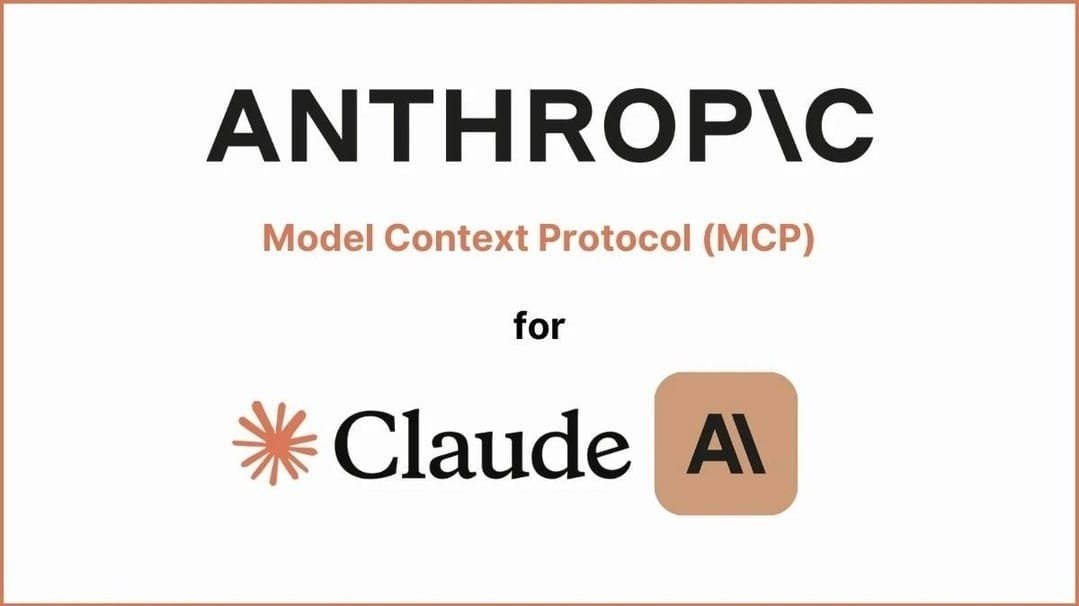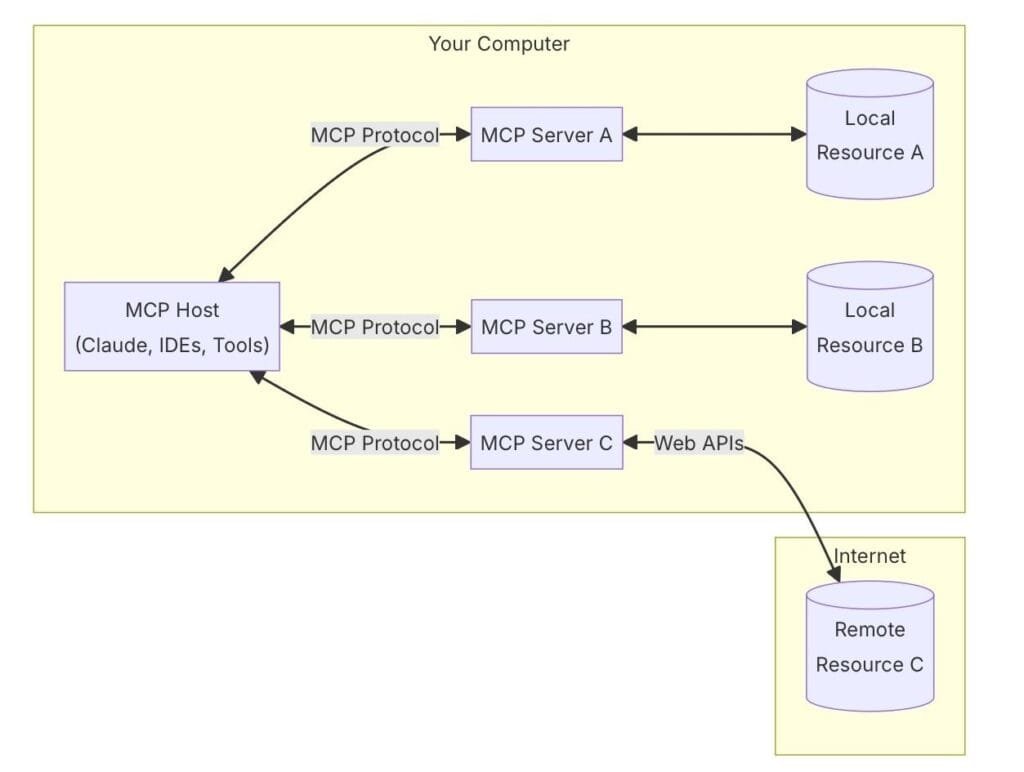
Model Context Protocol (MCP)
Model Context Protocol (MCP) represents a significant advancement in the capabilities of Claude AI, developed by Anthropic. As a context-awareness model, MCP enhances Claude’s functionality beyond basic language processing, effectively transforming it into a more versatile tool adept at automated interactions with external systems and data sources. This evolution is pivotal in expanding the range of applications where Claude AI can be implemented, addressing various user needs more comprehensively.
Traditionally, AI models like Claude have been primarily focused on responding to user queries and generating human-like text. However, with the implementation of MCP, the model can now access and utilize external information and data streams, thereby enriching its responses and ensuring they are contextually relevant. This makes Claude not only a conversational agent but also a capable assistant that can pull in real-time data for enhanced decision-making and problem-solving.
Furthermore, the integration of MCP allows Claude to engage with various APIs and other integration points, which substantially broadens its operational scope. Users can expect Claude to automate tasks that require interaction with different digital platforms seamlessly. For example, instead of just providing an answer to a user’s question, Claude can fetch information from databases, update records, or even trigger actions in external applications, thus streamlining workflows and increasing productivity.
In summary, the Model Context Protocol (MCP) is a groundbreaking evolution in Claude AI’s capabilities, making it a robust tool equipped for a wide range of applications. This advancement is essential for businesses and individuals who seek to leverage state-of-the-art AI technology for more effective and efficient interactions, ultimately enhancing user experience and operational efficiency.
Core Concept: Extending Claude’s Functionality
The Model Context Protocol (MCP) represents a significant advancement in how Claude AI interacts with external tools and data sources, effectively extending its functionality beyond traditional parameters. By integrating MCP, Claude can engage with a wider array of applications, enhancing its operational scope to deliver more comprehensive solutions. This development opens the door to multiple possibilities that were previously unattainable through conventional AI frameworks.
One of the standout capabilities of MCP is the ability for Claude to access local files. This means that users can direct Claude to read from and write to files stored on their devices. For instance, if a user needs to extract specific data from a spreadsheet or modify some content in a text document, Claude can seamlessly perform these tasks. This local interaction capability not only streamlines workflows but also significantly boosts productivity by reducing the time users spend toggling back and forth between applications.
Another vital aspect of MCP is its potential for querying databases. Claude can now communicate with various databases, retrieving valuable information as needed. This functionality is particularly beneficial for businesses that rely on real-time data for decision-making processes. For instance, a user can request Claude to pull sales data from a database and generate insights or reports based on the latest figures, enhancing data-driven strategies.
Furthermore, MCP facilitates automation across diverse tasks, allowing Claude to execute repetitive processes with little to no human intervention. Whether it involves scheduling emails, processing transactions, or managing content across platforms, the protocol empowers Claude to take over mundane tasks efficiently. By leveraging these capabilities, users can invest their time in more strategic initiatives, ultimately fostering innovation and growth.
Client-Server Architecture of MCP

The Model Context Protocol (MCP) introduces a sophisticated client-server architecture that significantly enhances the operational framework of the Claude AI system. Within this structure, the Claude desktop application serves as the client, while specialized MCP servers are tasked with delivering an array of external functionalities. This division not only facilitates the efficient handling of tasks but also underscores the modular nature of the system, promoting extensibility and customization designed to fit user needs.
At its core, the client-server model employed by MCP allows the Claude application to act independently while offloading specific processes to dedicated servers. This separation ensures a more responsive user experience, as the clients can quickly interact with the interface without being bogged down by complex computations or extensive data management. The MCP servers are equipped to handle specialized tasks, which can vary from data processing to multifaceted AI analyses. This dissemination of responsibilities creates a streamlined data flow, enhancing overall performance while reducing latency.
The modular design inherent to the MCP architecture empowers developers and users alike to customize their interactions with Claude AI. For instance, organizations can integrate additional servers to accommodate unique functionalities that align with their specific operational needs. Consequently, businesses can expand Claude’s capabilities by introducing new modules, tailored to their use cases, thereby enriching the overall user experience without compromising the integrity of the primary application.
This architecture not only supports present functionalities but also anticipates future expansions. With the ongoing evolution of technology and user demands, the flexibility provided by the MCP’s client-server structure ensures that Claude AI remains at the forefront of artificial intelligence applications. By embracing a modular design, the Model Context Protocol fosters an adaptable environment conducive to continuous growth and innovation within the Claude ecosystem.
Key Features and Benefits of MCP
The Model Context Protocol (MCP) significantly enhances Claude AI’s existing capabilities, introducing a range of features designed to optimize the interaction between artificial intelligence and users across various applications. One of the most notable features of MCP is its ability to automate complex workflows. With enhanced automation, Claude can manage intricate tasks that often require human intervention, streamlining processes in sectors such as customer service, project management, and data analysis. This functionality not only reduces the time taken to complete tasks but also minimizes the risk of errors inherent in manual operations.
Another crucial element of MCP is its improved contextual awareness. By granting Claude the ability to access external data sources, the protocol enriches the AI’s understanding of user queries and tasks, allowing for a more nuanced and informed response. This feature is particularly beneficial in sectors requiring timely and relevant information, such as finance and healthcare. For example, in a financial advisory scenario, Claude can pull in real-time market data to provide tailored investment advice, thus demonstrating the practical applications of contextual awareness in facilitating informed decision-making.
Furthermore, MCP contributes to increased productivity through task automation. By taking over repetitive, mundane tasks, Claude frees up valuable time for users to focus on more strategic responsibilities. For instance, in a marketing context, Claude can automate the generation of performance reports, enabling teams to concentrate on campaign strategy rather than data compilation. Through these features—enhanced automation, improved contextual awareness, and increased productivity—MCP positions Claude AI as a robust solution for businesses aiming to leverage artificial intelligence in their operations effectively. The diverse applications of MCP illustrate its versatility and potential to drive innovation across multiple domains.
Code Development Functionality: Introducing CodeMCP
The advancement of artificial intelligence continues to reshape the landscape of software development, and a notable contributor to this transformation is Claude AI through its integration of the Model Context Protocol (MCP). Among the applications of the MCP framework is CodeMCP, a specialized functionality that empowers Claude to serve as an intelligent coding assistant. By leveraging CodeMCP, developers are able to streamline their coding processes, enhancing efficiency and accuracy in various facets of software development.
One of the primary advantages of CodeMCP is its ability to edit code within local repositories. This functionality provides developers with real-time insights and suggestions, facilitating quick code modifications without the need for extensive manual intervention. As a result, programmers can focus on higher-level design decisions or addressing complex problems, while CodeMCP manages routine code alterations. This feature is particularly beneficial for teams that require rapid iteration cycles, as it reduces the overhead typically associated with code editing.
In addition to editing, CodeMCP excels in debugging code. By analyzing code within its context, Claude can identify and help rectify errors more effectively than traditional debugging methods. This advanced error detection not only improves code quality but also decreases the time spent on troubleshooting. Moreover, CodeMCP’s refactoring capabilities further enhance the software development lifecycle by allowing developers to restructure existing code without altering its external behavior, thereby optimizing performance and maintainability.
Ultimately, CodeMCP serves as a vital tool that enhances Claude AI’s contributions to software development. It capitalizes on the strengths of MCP to create a versatile coding assistant that supports developers at various stages of their projects, enabling them to produce higher-quality software with greater efficiency.
Technical Details of MCP Servers

The Model Context Protocol (MCP) is a system designed to enhance the capabilities of Claude AI by providing a flexible architecture for server development. At its core, MCP servers serve the purpose of facilitating communication between various applications and the Claude AI model, enabling the processing and understanding of complex data inputs. Development options for MCP servers are diverse, allowing developers to choose from various technologies and programming languages based on specific use cases and performance requirements.
For backend development, popular languages such as Python, JavaScript, and Java are frequently utilized due to their robust frameworks and libraries. For instance, Python, with libraries like Flask or Django, allows for rapid development of RESTful services that can easily interact with Claude AI. On the other hand, Node.js offers an asynchronous event-driven architecture, suitable for handling multiple requests efficiently. Java, known for its scalability and performance, can be employed for building enterprise-level applications, further enhancing the capabilities of MCP servers.
Among various types of MCP servers, we can identify those tailored for database access, which are crucial for retrieving and managing large datasets. These servers employ technologies like SQL databases or NoSQL systems, ensuring that Claude AI has access to relevant information in real time. Additionally, web service servers facilitate communication between the Claude AI model and external applications, allowing seamless integration and interaction. Utilizing frameworks such as Express.js for Node.js or Spring Boot for Java can further optimize the performance of these web services.
In essence, the versatility of MCP servers, along with the choice of programming languages and technologies, significantly contributes to the functionality and effectiveness of the Model Context Protocol in expanding Claude AI’s capabilities.
Configuration and Customization of MCP Servers
Configuring and customizing Model Context Protocol (MCP) servers offers users significant flexibility in adapting Claude AI to their specific needs. The configuration process is facilitated through designated configuration files that delineate the parameters and functionalities of the MCP servers. These configuration files are structured in a straightforward manner, enabling users to make necessary adjustments without extensive technical knowledge.
To initiate the customization process, users must access the configuration files where they can specify distinct operational parameters aligned with their unique requirements. This may involve defining the computational resources allocated to the server, setting limitations on processing speeds, or customizing the types of data that the server processes. Each of these specifications contributes to optimizing Claude’s performance within varying environments, whether they are research-oriented, enterprise-level, or individual-based uses.
Moreover, the ease of customization extends beyond initial setup. Users can modify these configurations seamlessly as their requirements evolve. For instance, if a user begins with a particular focus on natural language processing but later wishes to enhance image recognition capabilities, adjustments can be made swiftly through the configuration files. This adaptability is pivotal, particularly for users anticipating growth or shifts in their operational focus. Additionally, the MCP system fosters a collaborative environment where various teams can share configurations, streamlining workflows across departments or projects.
Ultimately, the configuration and customization features of MCP servers significantly enhance Claude AI’s utility. By allowing tailored settings to suit specific tasks and goals, users can leverage the AI’s capabilities more effectively, ensuring that it supports their strategic objectives in a format that is both accessible and comprehensible.
Security Considerations in the MCP Framework
In the implementation of the Model Context Protocol (MCP), security considerations are paramount. The MCP framework incorporates various built-in mechanisms designed specifically to protect sensitive resources, ensuring that the interactions between Claude AI and external systems are conducted in a secure environment. These security measures are essential not only for safeguarding data but also for preserving the integrity of operations that involve AI technologies.
One of the primary security features within the MCP framework is the robust access control system. This system allows users to define who can access specific resources and under what conditions. By employing role-based access control (RBAC), organizations can ensure that only authorized personnel have the ability to interact with sensitive data. This level of granular security is crucial, especially in environments where data privacy and protection are governed by strict regulations such as GDPR or HIPAA.
In addition to access control, the MCP framework also emphasizes data safeguarding measures. Encryption is utilized to protect data both at rest and in transit, rendering it unintelligible to unauthorized users. With advanced encryption standards in place, organizations can confidently manage user interactions without the risk of data breaches. Moreover, comprehensive logging and audit trails are established to track access and modifications, ensuring accountability in the handling of sensitive information.
Maintaining the integrity of the AI’s operations is another critical aspect of the MCP framework. Integrity checks help detect and prevent unauthorized manipulation of model parameters or output, thereby enhancing the overall reliability of AI operations. By employing secure coding practices and regular security assessments, organizations can mitigate risks associated with vulnerabilities in the AI models. Overall, the security features embedded within the MCP framework work collectively to create a robust environment that not only protects sensitive resources but also fosters trust in the AI’s interactions with various systems.
Conclusion: The Transformative Power of MCP
The introduction of the Model Context Protocol (MCP) marks a significant leap forward in the evolution of Claude AI, transforming it from a purely language processing model into a versatile tool capable of engaging with real-world tasks. This paradigm shift enhances Claude’s ability to interpret, understand, and respond to complex queries, making it an indispensable resource in diverse applications ranging from customer service to advanced decision-making processes.
With MCP, Claude is now equipped to navigate and manage intricate workflows, automating tasks that previously required human oversight. The capability to adapt its responses based on context ensures that the interactions are not only relevant but also enrich the user experience. This evolution is particularly relevant in environments where prompt and accurate information retrieval is crucial, demonstrating how innovative protocols can drastically expand the utility of AI systems.
Moreover, the implications of MCP extend beyond immediate functionalities. By enhancing Claude’s contextual understanding, the protocol lays the groundwork for future advances in artificial intelligence. It paves the way for more sophisticated methodologies that can integrate multi-modal data, adjust to nuanced conversational shifts, and effectively address user needs in real-time. As we envision future iterations of such frameworks, it becomes clear that the potential for expanded capabilities in AI is immense. The next phase of AI development may usher in even more profound transformations, with tools like MCP setting the standard for intelligent, adaptive interaction.
In conclusion, the Model Context Protocol not only elevates Claude AI’s operational prowess but also signifies a crucial step towards the broader ambition of creating AI that truly understands and interacts with the world comprehensively. The future of AI capabilities seems promising, with frameworks like MCP leading the charge towards more integrated and effective systems.
References:
Anthropic Resources:
- Anthropic Official Website: https://www.anthropic.com/
- Anthropic Blog: https://www.anthropic.com/blog
Related Technologies:
- Retrieval Augmented Generation (RAG): https://www.pinecone.io/learn/retrieval-augmented-generation/
- Large Language Model Context Windows: Search for “Large Language Model context windows”.
- Application Programming Interfaces (APIs): https://www.redhat.com/en/topics/api/what-are-application-programming-interfaces-apis
- Client-Server Model: https://www.cloudflare.com/learning/performance/what-is-client-server-model/
- GitHub Copilot: https://github.com/features/copilot
- Role-Based Access Control (RBAC): https://www.ibm.com/topics/role-based-access-control
- Data Encryption: https://www.cloudflare.com/learning/ssl/what-is-encryption/
